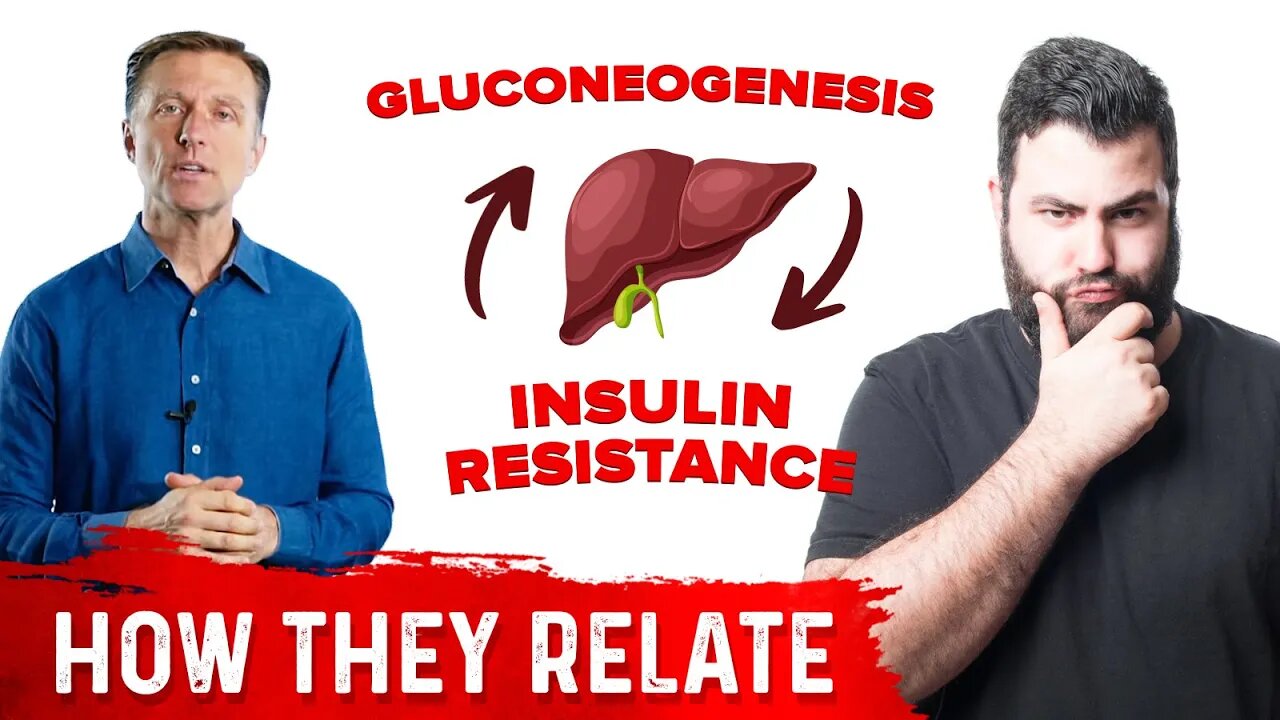Premium Only Content

Insulin Resistance and Gluconeogenesis
Here's what you need to know about insulin resistance and gluconeogenesis, especially if you have diabetes.
Timestamps
0:00 Introduction: What is gluconeogenesis?
0:35 How does gluconeogenesis work?
1:00 Insulin resistance and gluconeogenesis
1:45 I'm not eating sugar, but I have high sugar—why?
2:30 What you can do
2:42 What's happening in the body
5:14 Share your success story!
DATA:
https://www.ncbi.nlm.nih.gov/pmc/articles/PMC5927596/
https://pubmed.ncbi.nlm.nih.gov/9416027/
Let's talk about insulin resistance and gluconeogenesis. Gluconeogenesis is the new creation of glucose made by your liver. It's stimulated by a hormone called glucagon, and it's inhibited by a hormone called insulin. Insulin is triggered by glucose from the diet.
With gluconeogenesis, your body is making new sugar out of non-carbohydrate sources. Your body makes this sugar from protein, fat, and ketones.
This happens because your body does need a certain amount of sugar. However, the sugar your body needs does not need to come from your diet. Your body can make it from other sources.
Insulin resistance is a precursor for prediabetes. You'll have insulin resistance if you have prediabetes or diabetes. Diabetes and prediabetes are both high sugar situations. A high-carb diet can contribute to the situation, making it worse.
But, when someone starts to cut carbs out of their diet, sometimes their sugar is still too high. How can this happen if they're not eating any sugar? Well, it must be coming from gluconeogenesis.
The body is making more sugar because the "off switch" (insulin) is not working. You don't have enough insulin because your insulin resistance is so strong. You have so much resistance that the insulin is not able to get through. Your body senses a deficiency of insulin, and it will make more sugar.
If you're in this situation, you need to stay on the keto diet and keep doing intermittent fasting—just give it more time. Eventually, the insulin resistance will improve to the point where your liver won't keep making excess sugar.
Dr. Eric Berg DC Bio:
Dr. Berg, age 57, is a chiropractor who specializes in Healthy Ketosis & Intermittent Fasting. He is the author of the best-selling book The Healthy Keto Plan, and is the Director of Dr. Berg Nutritionals. He no longer practices, but focuses on health education through social media.
Follow Me On Social Media:
Facebook: https://bit.ly/FB-DrBerg
Instagram: https://bit.ly/IG-DrBerg
Anchor: https://bit.ly/Anchor-DrBerg
TikTok: https://bit.ly/TikTok-DrBerg
Send a Message to his team: https://m.me/DrEricBerg
Disclaimer:
Dr. Eric Berg received his Doctor of Chiropractic degree from Palmer College of Chiropractic in 1988. His use of “doctor” or “Dr.” in relation to himself solely refers to that degree. Dr. Berg is a licensed chiropractor in Virginia, California, and Louisiana, but he no longer practices chiropractic in any state and does not see patients so he can focus on educating people as a full time activity, yet he maintains an active license. This video is for general informational purposes only. It should not be used to self-diagnose and it is not a substitute for a medical exam, cure, treatment, diagnosis, and prescription or recommendation. It does not create a doctor-patient relationship between Dr. Berg and you. You should not make any change in your health regimen or diet before first consulting a physician and obtaining a medical exam, diagnosis, and recommendation. Always seek the advice of a physician or other qualified health provider with any questions you may have regarding a medical condition.
#keto #ketodiet #weightloss #ketolifestyle
Thanks for watching! I hope this helps you better understand insulin resistance and gluconeogenesis.
-
 9:21
9:21
Dr. Eric Berg
5 days agoWhy Men Today Have HALF the Testosterone of Their Grandfathers
6.22K8 -
 LIVE
LIVE
Anthony Rogers
1 day agoAnthony Rogers Show - 24/7 Stream
541 watching -
 2:11:55
2:11:55
Total Horse Channel
17 hours ago2025 CMSA Extravaganza | Mounted Shooting
46.6K1 -
 4:50:33
4:50:33
VapinGamers
7 hours ago $3.80 earnedGedonia 2 - Early Release Preview and Co-Stream! - !game #Sponsored
53.2K -
 1:32:39
1:32:39
Glenn Greenwald
13 hours agoWeek in Review: Trump's Tariffs, Ukraine Negotiations, Possibility of War with Iran, and More with Glenn Greenwald, Lee Fang, & Michael Tracey | SYSTEM UPDATE #438
140K59 -
 5:01:00
5:01:00
EnDuEnDo
7 hours ago🚨Vairety Stream 🎮 Push to 500 Followers 🚀 Chill Vibes 😎
25.9K1 -
 4:25:53
4:25:53
Nerdrotic
13 hours ago $38.54 earnedMarvel Is SCREWED | Daredevil Afterbirth | G20 is ABSOLUTE Cinema - Friday Night Tights 349 w MauLer
143K34 -
 56:03
56:03
BonginoReport
12 hours agoICE Boss Wants Deportations To Run like Amazon Prime - Nightly Scroll w/Hayley Caronia (Ep.25)
142K86 -
 45:12
45:12
Sarah Westall
9 hours ago“Most Important Story of the Decade” Globalists Move to Fund World Gov w/ Alex Newman & Sam Anthony
71.7K13 -
 16:23
16:23
China Uncensored
10 hours agoChina STRIKES BACK Against Trump Tariffs
36.9K8